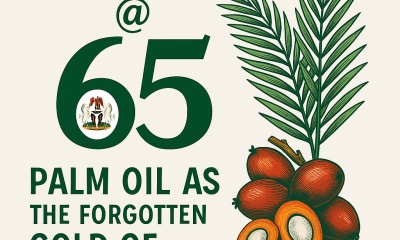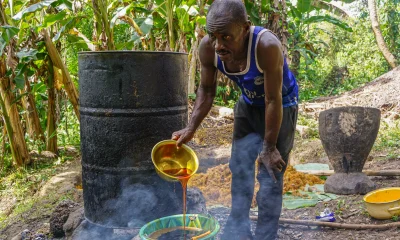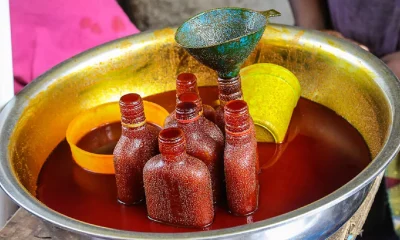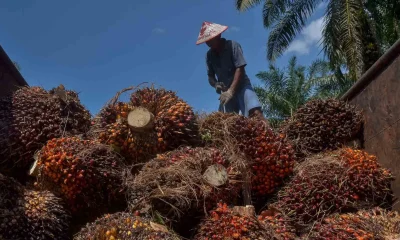Deep Dive
Adulterated Palm Oil: The Silent Threat in Africa’s Food Chain

Palm oil is one of Africa’s most important agricultural products, providing millions of households with cooking oil, soap, and even small-scale biofuel. But behind its bright red hue lies a growing crisis: adulterated palm oil. From Lagos to Accra, Freetown to Douala, palm oil is being compromised in ways that threaten consumer health, trade credibility, and Africa’s position in the global commodities market.
This silent threat is often overlooked, but its consequences are far-reaching. As demand for palm oil grows across Africa and beyond, the battle against adulteration is becoming a defining challenge for governments, traders, and consumers alike.
What is Adulterated Palm Oil?
Adulterated palm oil refers to palm oil that has been intentionally altered with harmful additives, artificial coloring, or low-grade substitutes to increase profit margins. Common adulteration methods include:
- Adding dyes such as Sudan III and IV – industrial colorants banned in food but used to enhance the red hue.
- Mixing with recycled cooking oil – cheaper oils reused multiple times, often rancid.
- Blending with inferior vegetable oils – to increase volume at lower cost.
- Excessive bleaching – stripping away natural carotenoids and antioxidants, then re-dyeing artificially.
The result? Palm oil that looks appealing on the market shelf but carries serious health risks.
The Health Consequences
The most alarming issue with adulterated palm oil is its impact on public health.
- Carcinogenic Risks:- Sudan IV, commonly used in adulteration, is classified as a Group 3 carcinogen by the International Agency for Research on Cancer (IARC). Prolonged exposure increases risks of cancer.
- Organ Damage:- Studies from the University of Ibadan and Ghana’s Food Research Institute reveal that adulterated oils can damage the liver, kidneys, and heart, particularly with long-term use.
- Food Poisoning and Acute Illness:- Short-term consumption may cause diarrhea, stomach cramps, and vomiting due to contamination from recycled oil.
- Loss of Nutritional Value:- Authentic palm oil is rich in Vitamin A, Vitamin E, and antioxidants. Adulteration strips these nutrients away, leaving behind harmful compounds instead.
This makes adulterated palm oil not just an economic fraud but a public health crisis.
Economic Impact on Africa’s Palm Oil Sector
Palm oil is a multi-billion-dollar industry, yet adulteration undermines its growth in several ways:
- Reduced Consumer Trust: Many urban African consumers now question palm oil’s safety, shifting toward imported alternatives.
- Export Rejections: Countries like Nigeria and Ghana have faced palm oil shipment rejections in Europe due to contamination, tarnishing Africa’s global credibility.
- Price Distortions: Adulterated oil sold cheaply at markets undercuts genuine producers, pushing down farmgate prices for smallholder farmers.
- Stunted Investment: International investors shy away from industries plagued by weak regulation and reputational risks.
In essence, adulteration damages both local livelihoods and continental competitiveness.
Case Studies Across West Africa
Nigeria – The Largest Producer, The Largest Problem:- Nigeria produces over 1.4 million MT of palm oil annually, yet imports remain high. NAFDAC (National Agency for Food and Drug Administration and Control) frequently issues warnings about palm oil adulterated with Sudan IV in open markets. In 2019, multiple seizures revealed entire supply chains compromised, particularly in Lagos and Onitsha.
Ghana – FDA Enforcement:- Ghana’s Food and Drugs Authority (FDA) has cracked down on adulterated palm oil, especially in Accra and Kumasi markets. In 2015, Ghana temporarily lost access to the EU palm oil market after shipments tested positive for Sudan IV. The scandal forced major awareness campaigns and stricter testing regimes.
Sierra Leone and Liberia – Informal Markets:- Here, palm oil is sold mostly unbranded in jerrycans, leaving consumers vulnerable. Traders often use coloring agents to make oil look “fresher” or “more natural,” creating a trust deficit in local markets.
Cameroon – The Export Bottleneck:- Cameroon produces roughly 400,000 MT annually, but exporters complain that adulterated palm oil in informal markets keeps prices unstable and creates international suspicion over quality control.
Why Adulteration Persists
Adulteration thrives because of a mix of economic desperation and regulatory weakness:
- Profit Margins – Adulterated oil can cost 30–40% less to produce, making it attractive for traders seeking quick gains.
- Weak Enforcement – Many African markets lack regular inspections, laboratory testing, and penalties.
- Consumer Ignorance – Most consumers buy based on color and price, unaware of hidden risks.
- Fragmented Supply Chains – With thousands of smallholders and informal traders, ensuring traceability is nearly impossible.
Consumer Awareness: How to Detect Fake Palm Oil
Consumers often rely on visual inspection, but adulterated palm oil can be difficult to spot. Warning signs include:
- Excessively bright red color (a sign of dye).
- Unnatural smell or chemical odor.
- Excessive foaming when heated.
- Unusual taste or bitterness.
Simple home tests, such as diluting a small amount in water (where dyes will separate), can sometimes reveal adulteration. But ultimately, traceability and certification are more reliable solutions.
Policy and Regulatory Responses
Governments are slowly waking up to the scale of the problem.
- Nigeria (NAFDAC) – Increased raids on adulterated palm oil in markets.
- Ghana (FDA) – Mass consumer education and introduction of palm oil certification schemes.
- ECOWAS Standards – Discussions around harmonized food safety standards for palm oil trade across West Africa.
- AfCFTA Opportunity – With continent-wide trade integration, there is an urgent need for pan-African quality benchmarks for palm oil.
The Global Trade Angle
Africa risks losing credibility in global palm oil markets if adulteration persists. Exporters already face stiff competition from Indonesia and Malaysia, who dominate with standardized, certified supply chains. If Africa continues to struggle with adulteration, it could permanently lock itself into being a net importer, despite its natural heritage as the origin of oil palm.
Solutions and the Way Forward
- Strengthen Regulation:- Governments must invest in routine inspections, laboratory testing, and stricter penalties for offenders.
- Empower Farmers and Cooperatives:- Farmer cooperatives can brand and market “pure, traceable palm oil”, building consumer trust and commanding premium prices.
- Certification and Traceability:- Adoption of RSPO (Roundtable on Sustainable Palm Oil) or a localized “Africa Pure Palm Oil” label could help create identity and trust in the market.
- Technology Adoption: Blockchain can track palm oil from farm to shelf, ensuring transparency. Mobile payment systems can help smallholders avoid middlemen who drive adulteration.
- Consumer Education: Public campaigns must highlight the health risks of adulteration and train buyers to demand certified products.
Conclusion: A Silent Threat That Demands Urgent Action
Adulterated palm oil is more than a consumer issue—it’s a continental challenge with health, economic, and global trade implications. Africa cannot afford to let its reputation be tainted at a time when palm oil demand is rising worldwide.
If tackled head-on—with stricter enforcement, consumer awareness, and modern supply chain solutions—Africa can turn this crisis into an opportunity, branding its palm oil as pure, safe, and globally competitive.
If ignored, however, adulteration could become the Achilles heel of Africa’s palm oil sector, undermining decades of effort to reclaim its rightful place in the global commodities market.






























